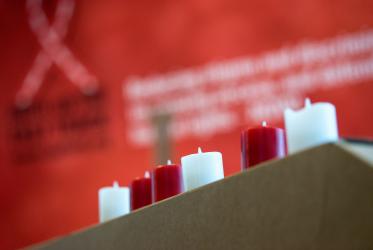“Leave no one behind.” That’s the urgent message of the World Council of Churches’ general secretary Rev. Dr Olav Fykse Tveit in a video released in preparation for a United Nations (UN) High Level Meeting on AIDS in New York, 8-10 June.
The WCC video is designed to encourage faith leaders to be outspoken and committed in the HIV response. Tveit calls on faith and government leaders to commit to a strong UN political declaration and take action to make it a reality.
The WCC Ecumenical Advocacy Alliance (WCC-EAA) has been communicating with WCC member churches and other organizations worldwide to outline key actions world governments must take in order to end AIDS by 2030. The WCC-EAA is advocating for government partnerships with faith-based and civil society organizations, ending stigma and discrimination, eliminating punitive laws and practices, funding, patent agreements related to treatment, the need for a new research-and-development framework, and other policies that will indicate a strong commitment from political leaders to end AIDS.
“As people of faith, we are all the more conscious that conflicts, inequalities and injustices prevent people everywhere from reaching their full potential, crush families and communities, and stop countries from achieving peace and economic prosperity,” states Tveit in the video. “Over the last four decades, the AIDS epidemic has thrown a glaring spotlight on these injustices that run through all of our societies.”
While there have been huge medical advances in HIV prevention and treatment, medical solutions alone are clearly not enough, he adds. “We have a crucial opportunity now, and it is in our power to take it. We want nothing less than to end the AIDS epidemic and leave no one behind.”
The WCC-EAA has stated that a new political declaration must support the leadership of people living with and most affected by HIV in the response; uphold human rights; ensure treatment for all, including children; integrate HIV with other health and development initiatives; and strengthen partnerships with faith-based and other civil society organizations to understand and address the barriers and injustices that contribute to the spread of HIV, including stigma, discrimination and gender inequality.
“And for all of this, we need predictable and sustainable funding that is sufficient to reach our ambitious targets,” states Tveit.
Just as AIDS cannot be resolved medically, the epidemic will not be ended only politically or economically, he added. “All of us, as individuals and as communities, must be committed to ending AIDS by 2030.”
Full video: WCC general secretary Olav Fykse Tveit's message to UN Interfaith Prayer Breakfast
More information on the High Level Meeting on AIDS and WCC-EAA talking points








